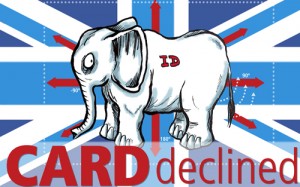I have written a blogpost for the Manifesto Club, which campaigns for freedom in everyday life, about the politics of ID cards – as promoted by both the Conservative and Labour parties, including that promoter of liberty and preserver of the NHS Margaret Thatcher – including some thoughts about what stage the national identity scheme would have reached:
By now, the link between passport applications and joining the national identity scheme should have been in place; it required a further act of Parliament, but the 2008 target date was 2011/12. So getting a passport would mean providing your fingerprints and a wide variety of personal data. Home secretary Jacqui Smith made the physical card optional in 2008, but left the databases – including the ‘audit trail’ that would track each individual’s usage – intact. The police hoped to be able to identify anyone on the system through their fingerprints (if the biometric technology worked properly, a debateable point). Not your papers please, but your fingers please. Continue reading “Margaret Thatcher, politicians and ID cards”


